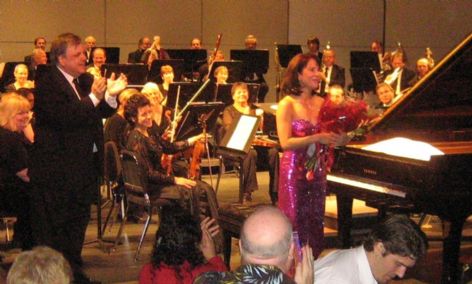|
Symphony
FROM THE NEW WORLD TO THE OLD WORLD
by Peter Lert
Saturday, June 14, 2025
Chamber
MC2 DUO RECITAL CLOSES 222'S SEASON
by Terry McNeill
Saturday, June 14, 2025
Choral and Vocal
CANTIAMO SONOMA'S LUSCIOUS A CAPELLA SINGING IN SEASON ENDING CONCERT
by Pamela Hicks Gailey
Sunday, June 8, 2025
Symphony
SRS SEASON ENDS WITH RESOUNDING TA-TA-TA-BANG
by Terry McNeill
Sunday, June 1, 2025
Symphony
YOUTHFUL VIRTUOSITY ON DISPLAY AT USO'S MAY CONCERTS
by Peter Lert
Saturday, May 17, 2025
Symphony
MYSTICAL PLANETS AND LIVELY GERSHWIN ORTIZ AT FINAL SRS CONCERT
by Peter Lert
Sunday, May 4, 2025
Symphony
VSO'S CONCERT MUSIC OF TIME, MUSIC OF PLACE
by Peter Lert
Sunday, April 27, 2025
VOCAL ELEGANCE AND FIRE AT THE 222'S RECITAL APRIL 26
by Pamela Hicks Gailey
Saturday, April 26, 2025
CANTIAMO SONOMA SINGS AN INSPIRED GOOD FRIDAY MOZART REQUIEM CONCERT
by Pamela Hicks Gailey
Friday, April 18, 2025
DRAMATIC SHOSTAKOVICH SYMPHONY CLOSES PHILHARMONIC'S 25TH SEASON
by Terry McNeill
Sunday, April 13, 2025
|
 |
 Conductor Les Pfutzenreuter Leads Applause for Pianist Elena Casanova May 15 |
ENERGETIC RUSSIAN WORKS END UKIAH SYMPHONY SEASON AT MENDOCINO COLLEGE
by Terry McNeill
Sunday, May 15, 2011
Balances in an orchestral concert, especially works from just one nation’s composers, are tough to graciously achieve. The Ukiah Symphony’s closing concert May 15 was heavily weighted with boisterous Russian works, and balances to some degree proved to be a concert-long problem.
Somehow a quiet piece slipped in to begin the event, Borodin’s tone poem “In The Steps of Central Asia,” and it was beautifully played. Principal flutist Becky Ayers and principal horn Ben Robinson had the lush opening themes and the tempos chosen by music director Les Pfutzenreuter were judicious. The brass had the requisite sonic punch, something they would need all afternoon.
Works by Khachaturian completed the first half, both muscular and pleasing to the audience of 350 in Mendocino College’s Center Theater. The ubiquitous Saber Dance in G Major (from the ballet “Gayane”) was first, the opening ostinato from timpanist Gabriel Sakakeeny telling and setting up whirlwind playing from the strings. It was mostly loud, raucous and though a pop favorite, heavily applauded. The equally potent Piano Concerto in D-Flat Major, Op. 38, continued the Orchestra’s penchant for sonic fireworks. Slow tempos were again selected and soloist Elena Casanova, playing from score, was in complete sympathy with Mr. Pfutzenreuter’s baton. Ms. Casanova’s octave technique, elfin scales and lyrical phrasing in the opening Allegro were effective, but often she was more seen than heard. The balance between the orchestra and the piano in this raw-boned work worked against the soloist, the horns and timpani often covering the piano line. The conductor sporadically tried to quiet things down, but it’s that kind of piece and the Symphony had mostly free reign. String sound throughout was very good save for raspy viola playing.
The lovely introduction to the Andante con anima was played by what I think was a bass clarinet, presumably in Erick Van Dyke’s capable hands, and the piano cadenza was characteristically insistent and artfully crafted. A novel instrument, an electronic wave length Theremin, had a negligible part and was played by Francis Rutherford.
The balances improved in the finale (Allegro) and the pianist’s right-hand skips and left-hand crossovers were always accurate. The jazz influence was underscored by the conductor and Ms. Casanova’s projection seemed to be getting stronger as the movement unfolded, her concentration riveting up to the final five dissonant chords. The Concerto is something one would hesitate to listen to every day, but a wild ovation indicated that the audience would perhaps have liked it again. There was no encore. Does the Ukiah Symphony encourage an encore from a soloist? The practice was essentially prohibited by orchestra management for decades, but now it is fairly common, and nearly always heard in Santa Rosa, Marin and Napa Valley Symphony concerts.
Mention needs to be made that the concert piano was positioned stage front at the beginning of the concert, thus saving setup time between the two Khachaturian pieces. Many orchestras still don’t do this and the Symphony stage manager is to be thanked for moving things along.
By far the best work Sunday occupied the entire second half, Stravinsky’s Suite from the ballet Firebird. As in many of the great Russian’s works (e. g., the Symphony of Psalms, the 1924 Piano Sonata) the bold rhythmic patterns are immediately established and in diverse ways carry through the five parts. Several parts melded together under the conductor’s direction, and here again the tempos were never rushed, the masterful orchestration always distinct. Stravinsky wasn’t a student of Rimsky for nothing. In the section “The Princesses’ Khorovod” there were fetching successive solos by oboist Beth Aiken, cellist Clovice Lewis, clarinetist Van Dyke and French horn player Mr. Robinson, over string tremolos. Mr. Pfutzenreuter was also able to coax some captivating pianissimos from his players.
The “Infernal Dance” part brought out some fine ensemble playing, albeit with the horns struggling to keep up. The fast parts found the conductor using a bevy of cues to keep all the sonic lines together. It was a convincing performance and surely a highlight of the season.
At intermission long-time Board member and section violinist Mary Carnevale was honored for her years of service (she is moving from Ukiah) and Mr. Pfutzenreuter made an impassioned speech for support of the arts program at Mendocino College, currently threatened by draconian budget cuts.
|

